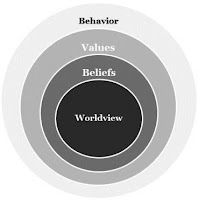If culture were an onion, worldview would be the core. Since culture is a universal feature of all human communities[3], it is essential to have a thorough understanding of what worldview is and how it shapes a given culture. What is seen in a given culture is the outward expression, or behavior, that is shaped by a multitude of things. When Christian missionaries visit a foreign land, it is important to understand that the people they encounter behave as they do for much the same reasons that people in the missionaries’ home countries do: they have a patterned way of doing things.[4]
Underlying the behavior that can be observed are values which Kwast defines as “pre-set” decisions that a culture makes between choices commonly faced which helps those who live within the culture to know what should or ought to be done in order to conform.[5] That such a pattern for living has been accepted takes into account that there are subcultures within the larger context. Here conformity is used in a broad sense. Beyond the behavior found in a culture that can be observed and the values that guide those behaviors, is a deeper level of shared understanding known as cultural beliefs.
Beliefs in a culture seek to answer a seemingly simple question: what is true? This is an interesting question that can seem to be at conflict with values and behaviors seen in the culture. While is it possible to observe similar behaviors and expressed values by people in a given culture, some in the culture can and do express completely different beliefs about those values and behaviors.[6] Kwast describes this as a difference between operating beliefs that actually affect values and thus behavior and theoretical beliefs which are stated creeds that have very little practical impact on values and behavior.[7]
At the very heart of culture is the worldview held by the people within the culture. People generally do not think about their worldview and most actually mistakenly believe that the peoples of other cultures think and reason in much the same way as they do.[8] While early missionaries may have held this mistaken notion, the modern missionary knows much better. Worldview may best be described as the part of culture that answers the most basic questions of reality that are seldom asked such as what is real, where did we come from, is what we can see all there is, how does the past influence the future, can the future be known?[9] And on and on! Every culture assumes answers to these and other questions about reality which shape the other aspects of culture. Interestingly, the confusion seen at times at the belief level is caused by conflicting worldviews. At times aspects of worldview compete with other aspects leading to conflict.
This simple explanation of worldview could be expanded upon greatly but is sufficient to drive home the point: Christians who share the gospel must understand the importance of the culture. Worldview influences the belief system of a given people group which in turn inform the value system of those people. Taken together, this is observable in the behavior of the people. Communicating the gospel cross-culturally should then focus on the worldview of the people. Simply introducing a new or competing system of beliefs will likely accomplish little as there will be no change in the values and behavior that is still held firmly in place by the existing worldview.[10]
[1] Hesselgrave, David J. Planting Churches Cross-Culturally: North America and Beyond (2nd ed.). (Grand Rapids, MI: Baker Academic, 2000), 126.
[2] Moreau, A. Scott, ed. Evangelical Dictionary of World Missions. (Grand Rapids, MI: Baker Books, 2000), 1032-33.
[3] Tennent, Timothy C. Invitation to World Missions: A Trinitarian Missiology for the Twenty-first Century. (Grand Rapids, MI: Kregel Publications, 2010), 168-75.
[4] Winter, Ralph D., and Steven C. Hawthorne, eds. Perspectives on the World Christian Movement: A Reader (4th ed.). (Pasadena, CA: William Carey Library, 1981, 1992, 1999, 2009), 398.
[5] Ibid.
[6] Ibid, 398-99.
[7] Ibid.
[8] Moreau, A. Scott, ed. Evangelical Dictionary of World Missions. (Grand Rapids, MI: Baker Books, 2000), 1033.
[9] Winter, Ralph D., and Steven C. Hawthorne, eds. Perspectives on the World Christian Movement: A Reader (4th ed.). (Pasadena, CA: William Carey Library, 1981, 1992, 1999, 2009), 399.
[10] Ibid.
